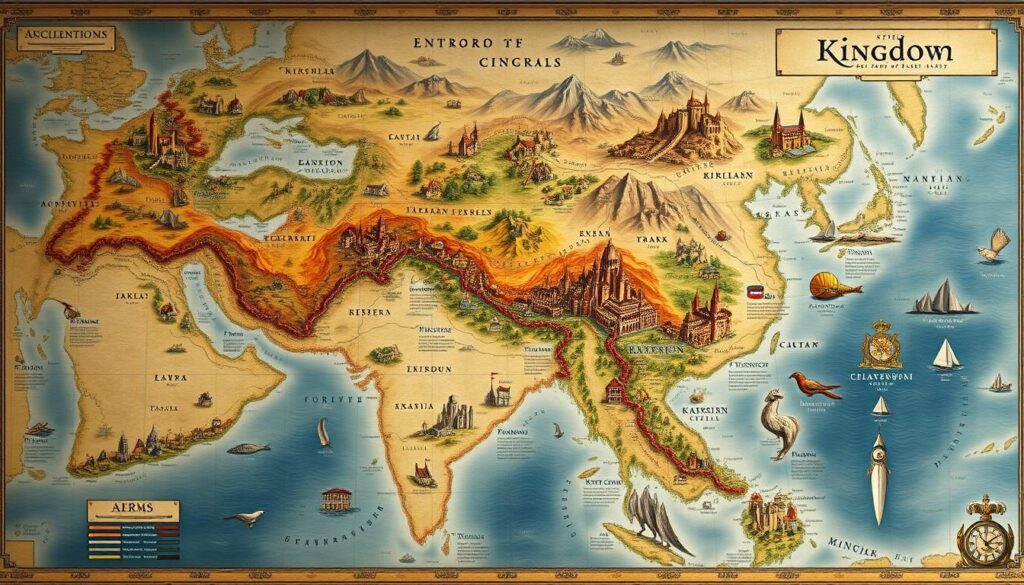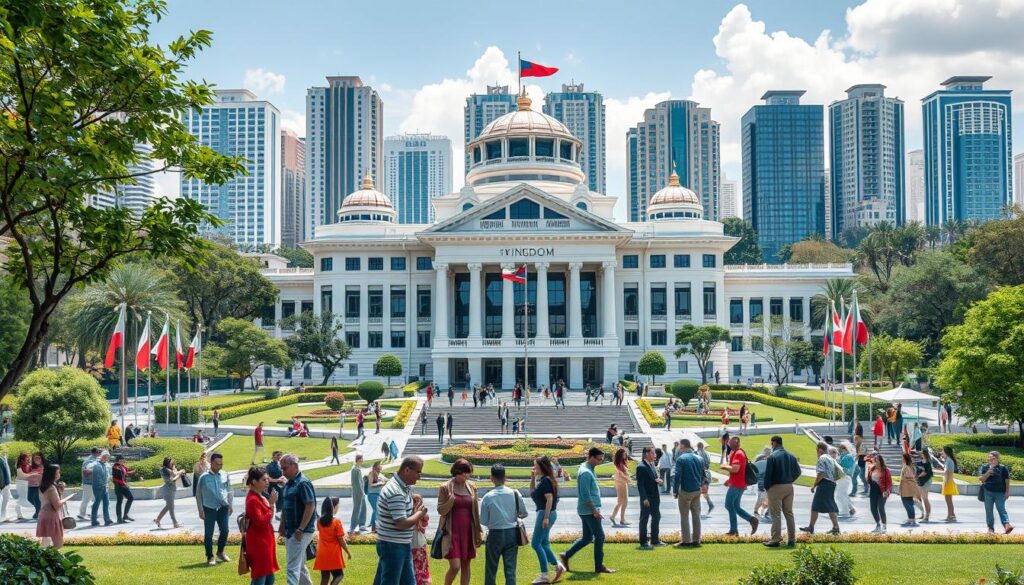Kingdoms have shaped our world for thousands of years. They come in all sizes, from small tribes to big empires. The number of people needed for a kingdom changes a lot.
Looking at history helps us understand this. The first kingdoms started around 3000 B.C.E. They didn’t need a lot of people to rule. Places like Teotihuacan had huge cities with over 100,000 people.
Good leaders and strong control are key to a kingdom. Having many people is important, but so is how well you govern and manage your economy. This helps a kingdom last and thrive.
Key Takeaways
- Kingdoms can emerge with varied population sizes
- Leadership quality matters more than raw population numbers
- Economic infrastructure is crucial for kingdom sustainability
- Historical examples show diverse population requirements
- Territorial control is essential for kingdom formation
Understanding the Basic Components of a Kingdom
Kingdoms are complex social structures. They come from good leadership and control over land. The number of people needed to start a kingdom varies. But, some key things stay the same in history.
To make a kingdom, you need more than just people. You also need a good system of government. This system turns a group into a strong political unit.
The Role of Territory and Leadership
Territory is the base of any kingdom. The term “kingdom” literally combines “king” and “domain,” showing how important land is. Key things include:
- Defined geographical boundaries
- Strategic location for defense
- Resources to sustain population
- Clear leadership structure
Essential Power Structures Within a Kingdom
Good kingdoms have detailed power structures. These help share tasks and keep things in order. These structures usually have:
- Central monarch or ruler
- Noble class or administrative officials
- Military leadership
- Religious or cultural advisors
Historical Examples of Kingdom Formation
“Every kingdom must have a constitution that delineates the responsibilities, laws, rights, and privileges of its citizens.”
Early kingdoms started around 3000 B.C.E. in places like Sumer and ancient Egypt. These places showed that having a strong government and land control was more important than just having people.
The number of people needed for a kingdom depends on many things. These include the leader’s skill, how well resources are managed, and the vision for the future.
How Many People Do You Need to Have a Kingdom: Historical Perspectives

History shows that the number of people needed for a kingdom changed a lot. Medieval European kingdoms started with small numbers. This challenges what we think about starting a state today.
The Domesday Book tells us England in 1086 CE had about 1.5-2 million people. This shows a kingdom can work with a small number of people.
There are key things that decide how many people a kingdom needs:
- Territorial control
- Military strength
- Leadership capabilities
- Cultural unity
Small kingdoms often came after big empires fell. African kingdoms like Ghana and Mali showed a small population can make a strong political unit. These kingdoms proved it’s not just about how many people you have. It’s about how well you organize and strategize.
“A kingdom’s strength lies not in its population size, but in its ability to unite and govern effectively.”
There’s interesting data on how many people were in different kingdoms:
- Carolingian France: About 5 million people
- Typical medieval European polity: 400,000 to 500,000 people
- Some city-states: As few as a few hundred individuals
The number of people needed for a kingdom really depends on a few things. It’s about how well people work together, the quality of leadership, and keeping a political system going. Successful monarchies show that having a lot of people is just one part of being a strong kingdom.
Modern Requirements for Establishing a Kingdom
Starting a kingdom today is more than just having people. It needs careful thought about politics, money, and laws.

Today’s kingdoms face complex rules from around the world. They must meet these standards, not just have lots of people.
Legal and Political Prerequisites
Modern kingdoms need strong laws. Most have leaders chosen by people, not just born into power. They must follow democratic rules and protect human rights
- Constitutional governance
- Transparent political processes
- Protection of citizen rights
Economic Foundations for Kingdom Formation
Stable money is key for a kingdom. Nations need:
| Economic Criterion | Minimum Requirement |
|---|---|
| GDP Stability | Consistent growth |
| Foreign Investment | Attractive investment climate |
| Infrastructure Development | Modern transportation and communication networks |
International Recognition Factors
Being recognized globally means having good diplomatic ties. It’s about following world laws and standards. Diplomatic recognition is more important than just having land.
“In the modern world, a kingdom’s legitimacy is measured by its global partnerships, not just its land boundaries.”
Conclusion
Finding out how many people make a kingdom is not just about counting heads. It’s about many things like leadership and how well a place is run. Good leadership and strong government are key to making a group into a kingdom.
Studies show that kingdoms succeed because of their social structure, not just how many people live there. Some kingdoms were small but strong, while others needed more people to keep going. The number of people needed changes a lot, depending on where they are, their wealth, and how stable their government is.
In today’s world, being recognized as a kingdom is not just about how many people you have. It’s about your diplomatic skills, your economy, and where you stand in the world. Good government is what keeps a kingdom going, not just numbers.
Creating a kingdom is a complex mix of people, goals, and how well things are managed. It’s not just about numbers. It’s about culture, economy, and politics all working together.

